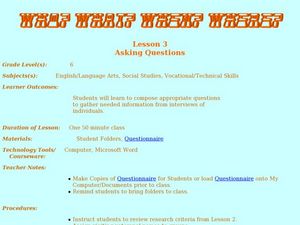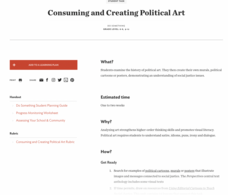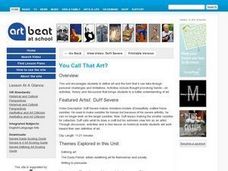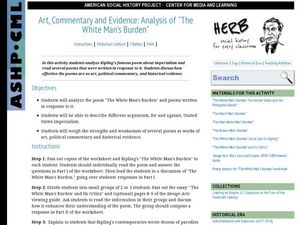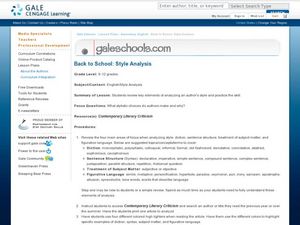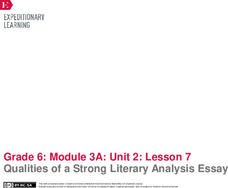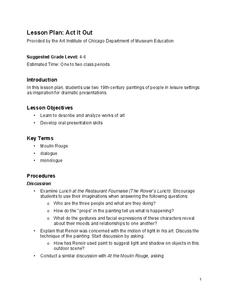Curated OER
Who? What? When? Where? Asking Questions
Sixth graders interview Veterans or role play to answer who, what, where, when questions. In this Veteran's Day questioning activity, 6th graders learn about the events in the military service of veterans. Students may simulate...
Houghton Mifflin Harcourt
Core Analysis Frame: Fiction
Dig into any piece of fiction with a series of analysis questions. There are two levels of questions provided: basic and in-depth. The basic questions can be copied double-sided onto a single piece of paper, while the in-depth questions...
Teaching Tolerance
Consuming and Creating Political Art
A picture is worth a thousand words, but political art may be worth even more! After examining examples of political cartoons, murals, and other forms of public art, class members create their own pieces to reflect their ideals and...
Houghton Mifflin Harcourt
Around Town: Neighborhood and Community: Challenge Activities (Theme 3)
Here is a unit consisting of activities designed to challenge your scholars. The extended learning opportunities include planning a celebration, making a presentation to the class, poster making, writing poetry, a problem-solving...
Curated OER
Regarding the Fountain: Questioning Strategy—Cubing
Look deeper into the text with a reading strategy based on asking critical thinking questions. While reading Reading the Fountain by Kate Klise, learners think of questions that help them describe, compare, associate, analyze, apply, and...
Curated OER
Finding out about Gallery 33
While these worksheets are specific for use while visiting the Birmingham Museum and Art Gallery, they could be used to guide nearly any museum trip. Questions focus on human activity, symbolism, culture, religion, and society as they...
Curated OER
You Call That Art? - Activity 1
Learners formulate a definition of art in the introductory lesson for a unit on various art forms. The learning emphasis is placed on Oregonian artist Duff Severe and reflective writing. Students compose an essay describing various art...
EngageNY
Text-Dependent Questions Text-Dependent Questions and Making a Claim: Digging Deeper into Paragraphs 12–14 of Steve Jobs’ Commencement Address (and connecting to Chapter 9)
Readers draw connections between Bud, Not Buddy and Steve Jobs' 2005 Stanford University commencement address and cite evidence from the two texts to support their analysis.
Curated OER
Looking and Learning in the Art Museum
Have you just visited an art museum? Or can you create a gallery in your classroom to visit? Pupils create an original drawing that reinforces what was learned in a visit to the art museum. They will view original art work and verbally...
Curated OER
Out of the Dust: Questioning Strategies
Bloom's Taxonomy is a great way to address the many levels of comprehension. With explanations and examples of each level, you can create questions that focus on knowledge, comprehension, application, analysis, synthesis, and evaluation.
Curated OER
Hoot: Bloom's Taxonomy- Questioning Strategy
What better way to examine a text than to ask your own questions? Use Bloom's taxonomy to guide kids through Carl Hiaasen's Hoot by asking questions based on knowledge, comprehension, application, analysis, synthesis, and evaluation.
Novelinks
The Crucible: Questioning Strategies Bloom's Taxonomy
Enrich your unit on Arthur Miller's The Crucible with a list of reading questions based on Bloom's Taxonomy. Kids answer questions and provide context for the knowledge, comprehension, application, analysis, synthesis, and evaluation...
Curated OER
Art, Commentary and Evidence: Analysis of "The White Man's Burden"
A cross-curricular lesson combines poetry and history for your middle and high schoolers. The class critically examines Kipling's poem, "White Man's Burden" as historical evidence of the Imperialist ideology popular during his time. The...
Curated OER
Back to School: Style Analysis
Jump back into expository writing and analysis at the start of a new school year! Start with a review of an authors' stylistic choices in diction, syntax, treatment of subject matter, and figurative language. Writers choose a text to...
Curated OER
Lesson Plan: Wide Open Spaces
What's the difference between city space and wide open space? Young analysts explore each space through writing, critical thinking, and discussion. They use what they learn to create collages that exemplify both worlds. Great discussion...
Curated OER
Things Fall Apart: Question Answer Response Theory
Passages from Chinua Achebe's Things Fall Apart provide the text for a QAR: Question Answer Response comprehension activity. Readers respond to right there, think and search, on your own, and author and you questions.
New York State Education Department
English Language Arts Examination: June 2017
Plants prefer classical music to rock and roll. That's one of the claims in an informational passage that makes up part of a set of standardized assessment questions. The set is part of a larger collection of English language arts tests...
Novelinks
The Little Prince: Blooms’ Taxonomy Questions
Question what you read with a lesson based on Bloom's Taxonomy. As kids read The Little Prince by Antoine de Saint-Exupéry, they formulate questions with cues from a graphic organizer, and answer them to work on critical thinking skills.
Brigham Young University
Introducing the Text and Learning the Process of Script Analysis
Where do directors and set designers get their ideas so that the set they build creates the mood and atmosphere the director wants for a production? From the script! Introduce theater high schoolers to the script analysis techniques used...
EngageNY
Qualities of a Strong Literary Analysis Essay
Read like a writer. Scholars read a model literary analysis in preparation for a similar writing assignment before annotating each paragraph for the gist. Next, pupils devise a list of qualities of a strong literary analysis essay.
Pearson
Practice Test - English Language Arts Reading Comprehension
An English Language Arts Reading Comprehension Practice Test for Grade 10 asks scholars to read a poem and answer two multiple-choice questions about the poem. They finish the task by responding to an open-response essay question.
Winterhill School
Poetry Analysis
Gain greater insight into poems using a poetry analysis worksheet. Here, scholars follow steps and answer questions to dissect any poem. Topics include the poem's meaning, theme, technique, and structure, as well as personal thoughts and...
Appalachian State University
The Fault in Our Stars: A Movie Study Guide for Eighth Grade Language Arts, Social Studies, and Science
How would you spend your last days with a loved one? The movie guide for The Fault in Our Stars prompts scholars to compare important scenes from the novel to the film and contains background information about the author, guided...
Art Institute of Chicago
Act It Out
Examine two works of art and use these pieces as inspiration for dialogues. The whole class discusses Renoir's Lunch at the Restaurant Fournaise and Toulouse-Lautrec's At the Moulin Rouge. Then, in groups of either three or ten, pupils...


